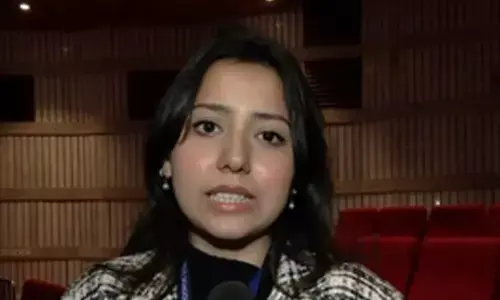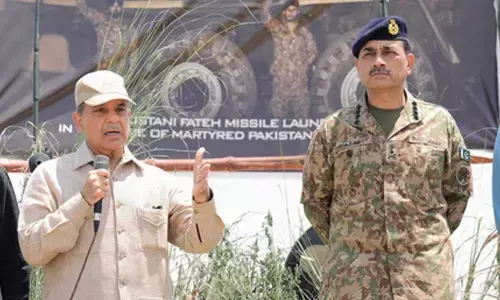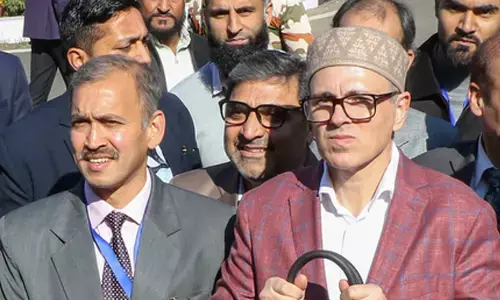MyVoice: Views of our readers 15th January 2023

MyVoice: Views of our readers 2nd February 2026
Views of our readers
Attacks on judiciary by govt not in good taste
In what appears like a concerted attack on the collegium system adopted by the Supreme Court of India for top-level judicial appointments, Vice-President Jagdeep Dhankar and Law Minister KirenRijiju are continually making a relentless comments against the Supreme Court for striking down the National Judicial Appointments Commission (NJAC) Act in 2015. This onslaught is disturbing and wholly unwarranted. Even as there is a huge pendency of cases, both the organs of government have to bear blame for not agreeing on the Memoranda of Procedure on appointing the judges. But any such friction should be settled at the negotiation table rather than mounting attack by one on the other publicly.
Vice President Jagdeep Dhankhar Wednesday said that in a democratic society, "the basis" of any "basic structure" has to be the supremacy of the mandate of people and the primacy and sovereignty of Parliament, and that legislature is "inviolable." He seems to forget the equal principle doctrine by the Constitution as regards the organs of the government - Legislature, Executive and Judiciary. Such remarks are uncalled for and would be seen as a tirade against the judiciary, the last refuge of justice for the people.
D Kameshwara Rao, Nizamabad
II
Vice PresidentDhankar's remarks on the judiciary at Presiding officers' meeting are not in good taste. He attributed one-upmanship to judiciary in a cavalier manner in his speech.The judicial review is the best way to keep the possibility of majoritarian decisions by legislature in check.Particularly where the government of that day is run by ruling party with my way or high way attitude, the judicial review would come handy for the people from any violations to their rights. The basic features of the constitution that consist of democratic norms, balance of powers between three pillars and mode of governance are rigid and cannot be violated.
The parliament can bring a new law if it's not satisfied with the view of judiciary on a particular act, but it cannot deny the right of judiciary to review it. Both enjoy equal powers, as far as they are in their respective limits, bestowed upon by the constitution.
Dr DVG Sankararao, Vizianagaram
III
Vice President JagdeepDhankar's statement raked up again a controversy on who is superior –judiciary or Parliament – which was raised already by the previous Speaker some years back. In fact India is a democratic country and as such the Parliament where the members are being elected from people represents the people's voice and hence it is superior. Indian constitution has separately fixed the duties of both. Hence in one way the V-P's remarks hold good that if any authority questions the parliament power to amend the constitution it would be difficult to say that we are a democratic nation.
The executive has to follow the laws and the judiciary cannot intervene in law making. Some time back we saw the Supreme Court itself formed a committee to deal with one situation where it is the duty of Parliament. Frequently we see that some PILs are accepted by the court which urge the court to instruct the government not to go in that direction. The duties of both judiciary and Parliament are specifically fixed and no one need to intervene into other's duties. Of course, if any law passed by the Parliament causes damage to the constitutional rights of the public given by the constitution, definitely the court needs to interfere because the basic duty of the court is to protect the people from any damage that interferes with the rights of the public.
TSN Rao, Hyderabad
IV
The Vice President should rather concentrate on the normal functioning of the RajyaSabha and he should also take care of grievances reported to him by a common people. Dhankhar also rightly said that the judiciary, the executive, and the legislature should confine themselves to their respective domains and conform to the highest standards of propriety and decorum. That indeed is the sine qua non of a healthy democracy. But his remarks on the supremacy of Parliament were not very accurate. His belief that Parliament has the absolute right to amend the Constitution, which "is not subject to any other authority," is misplaced.
Even more objectionable is his attack on the basic structure doctrine. In 1973, in the KesavanandaBharati case, the Supreme Court came up with this doctrine, asserting that Parliament has the right to amend the Constitution but not alter its (the Constitution's) basic structure. In a way, the doctrine is tautological: the basic structure of any constitution — or, for that matter, anything else—cannot be changed unless you want to change the entire thing. The basic structure of a constitution can be changed by only those people who do not believe in it.
The fact that the Vice-President of the nation says such a thing makes it even more unacceptable.
The tautology became a bold statement by the legendry SC justice HR Khanna, as judiciary was made to fight the forces of dictatorship that were gaining strength at that time. This is the reason that no politician, not even from the Congress, has attacked this doctrine.
Yash Pal Ralhan, Jalandhar
The elitist ways of Hyderabad Metro
The state government has not taken any steps to finish off the last stretch of Metro from the MGBS bus stand to Falaknuma. The stretch is very vital, and it could boost tourism in the area and provide much needed relief to the citizens of the Old City. Instead of focusing on finishing the last stretch of the first phase, the government is hell-bent on building the new line from Raidurg to the airport. Yes, the airport route is important, but not at the cost of neglecting the finishing of the remaining portion of the first phase.
Also, it is quite possible to extend the MMTS to the airport for a meagre sum of only Rs50 crore. But the government wants to build the airport line from Raidurg to the airport at a cost of Rs 6,250 crore. And why is the government not keen on the second phase from Lingampally to Lakdikapool? This line is the need of the hour.
Just when the ridership is increasing and about to reach the magical figure of 5,00,000 per day, comes the shocking news that the fares will be increased from the minimum fare of Rs 10 to Rs 20 and the maximum fare from Rs 60 to Rs 100. HMRL can't simply sit back smugly and say that commuters will accept the hike without a murmur. Yes, they might, but the ridership would decrease, and the idea of the Hyderabad Metro being an affordable, safe, and convenient public transport option would be defeated. The Hyderabad metro would become an elitist travel option like flying, whose fares have shot up so much that the middle class can't afford it any longer.
The last-mile connectivity is a joke, and the seven-seaters and autos continue to fleece the poor commuters. Except for the innovative Rs 59 "travel as much as you like holiday card," there has not been any other innovative schemes from HMRL. There were promises of a combined RTC and Metro card, but the scheme has not seen the light of the day.
Dr M Anil Ramesh, Hyderabad
HAIL SANKRANTHI!
Sankranthi- the rich festival Of our glorious culture, Rainbow-hued Rangolis Decking all houses, Bonfires at street-corners Of villages and towns Burning and illumining Wintry morning, Devotional songs From Haridas resonating In morning breezes, Cute, caprisoned Bulls colourfully embellished, Dancing, nodding their heads
At the behest of their masters For gifts from house-holders, Houses of farmers graced With the wealth of paddy Freshly harvested, Chantings of priests From temples in serene morning, Children clad in new clothes
Laughing and screaming in joy Festive joy of meetings, Greetings and sharing Of pleasantries and sweets,
Festive radiance of culture Pervading everywhere, Hail Sankranthi, savour The joy of the festival
Dr Venugopala Rao Kaki, Kakinada
A great inspiration to younger generations
Though Chief Minister K Chandrashekar Rao had given his consent to appoint A ShanthiKumari as the Chief Secretary of Telangana following the order of DoPT to relieve Somesh Kumar of the post, it is indeed commendable that ShanthiKumari could reach the pinnacle of her illustrious career as a civil servant with ease and aplomb by trouncing myriad of constraints that came her way, both administrative as well as political.
Shanti Kumari in her appointment to the top post has several firsts to her credit. She is the first woman Chief Secretary of Telangana. She is perhaps one of the few who is left with ample length of service in top position to serve the people of Telangana.
What is startling is unlike most blue-blooded babus of Indian Administrative Bureaucracy, Shanti Kumari radiated from the domain of middle classes to whom aristocracy is unfathomable.
The event leads me to cherish the memories of Shanti Kumari's father A Radhakrishna Murthy.Murthy served as a senior officer with State Bank of India in Hyderabad Circle. He was widely reputed for his sincerity, austerity and amiability. Soft and religious minded by nature, as Head of The Disciplinary Proceedings Department in LHO, SBI,Hyderabad, he used to feel it painful while dealing in punitive matters. ShanthiKumari indeed is worthy daughter of a worthy father. The new Chief Secretry proved: "We can do anything that men can do."Her accomplishment is an inspiration to the younger generation.
– D V Sankara Rao, Hyderabad
Give publishing sector industry status
The Golden Globe award for the song "NAATU NAATU" from the Rajamouli's multilingual film RRR is indeed a great fillip for both music and film industry. The multilingual song itself has shown a mirror to those hate mongers in ruling party who continue to target songs, films and particular persons that the music and films have no barrier and that it was one plus point the Juries would have taken to prove to the world that India still respectsunity in diversity.
It is good that the PM has joined the masses to praise the makers of the films for winning the prestigious award.
However, it is not enough on his part to praise the team for winning the award. It is time for him to use the opportunity to put an end to hate and intolerance as it is no use we celebrate our success, but allow hate and intolerance to flourish just for the sake of winning more seats and elections.
We seem to have forgotten that during previous BJP rule under Atalji, film making was given Industry status which has resulted in more films being made to entertain the people and sending both good and message to them.The question always comes to my mind which I would continue to raise, if film makers are entertaining the masses, why the publishing houses in India who have been educating the nation for more than a century should not be given industry status.
The pandemic has ruined the publishers except a few of them.Both those educating and entertaining the people should get the same status. If film scripts are accepted as collateral even without knowing whether film would click or not, why not books.
N Nagarajan, Hyderabad
It's time we arose to Vivekananda's fervent call
Former vice-president of India has rightly highlighted Swami Vivekananda's eternal message of divinity of man as this only energises the psyche of a nation steeped in inertia holds true in all aspect. Further, this also galvanises youthful minds with powerful, action-inducing messages that to get out from the trap of worldly miseries, spiritual knowledge is the only thing that will destroy our miseries forever and help evolve humanistic impulses in us. Following the gospel of his guru Ramakrishna Paramahamsa, Swami Vivekananda not only imbibed every word of his teachings but felt convinced that path of knowledge and love only leads us to truth and goal ultimately.
True to his teachings that education is the manifestation of the perfection already in man and religion is the manifestation of the divinity already in life. By and large, the teachings of Ramakrishna Paramahams had clearly reflected in the famous speech of Swami Vivekananda at the World's Parliament of Religions in Chicago on September 11, 1893. This not only left a deep impression on the audience comprising religious personalities of various faiths from across the world but it also influenced the thinking of all Indians that God alone is the real and eternal substance and therefore love of God can remove discrimination, jealousy,ego, desire, selfishness etc in this world. All in all, as Swami Vivekananda exhorted every man and woman to strive for moral and spiritual living that helps them to manifest perfection, let us all arise to imbibe his teachings and follow it scrupulously and not stop it until the goal is reached.
K R Srinivasan, Secunderabad
Telugu states in grip of election fever
Election fever is catching up slowly but certainly both in AP and Telangana. Leaders of all parties are busy, chalking out plans and counter plans to browbeat their opponents. Farmers,women, employees and youth do play key roles in elections. It is only natural therefore that governments and opposition parties leave no stone unturned to win over the favour of these voters.The governments in both the States are rolling out job notifications in quick succession. They are also trying hard to win back the faith and support of employees.In this regard, Jagan is a bit lagging behind. He knows that his employees are piqued with him over some of his decisions and delay in fulfilling major promises made to them last time. It is time he won back them at the earliest lest he should face some unfavorable winds. The suspension of the GO 1 by the AP High Court is a setback to Jagan. PawanKalyan too made his position clear by admitting that his party cannot win elections on its own and therefore he has opted for pacts with other parties.This time around he gets a chance to play some meaningful role in AP politics.
In Telangana, the Opposition including the BJP hopes that the anti-incumbency element works out in their favour. It is clear now that in both the States caste, combinationsand currency are going to play decisive roles in the forthcoming elections which may be advanced as part of an election strategy to hoodwink the unprepared parties.
M Somasekhar Prasad, Hyderabad
The freebie way to power
Faced with inability to resolve issues haunting people, the political class leans on Robin Hood politics and flies over economics, every regional party is thinking of how to grab power in next elections rather than developing the state which elected them. All simply depend on the short-cut method of offering freebies. The pestilence of freebies ruined the development of states and their economic state is in a shambles. No one is able to check this menace. The FinanceCommission could devise a mechanism to limit the expenditure on populist schemes vis-a-vis FRBM Actas the very least safeguard which ensures that basic public services are not starved.
So called regional party heads like Kejriwals, Jagans,Mamatas, and the Chief Ministers of Congress-ruled states like Chhattisgarh, Rajasthan purely depend on this formula to come back to the power. For them the development of the respective states are least preferred in their agenda.Where is our country heading to with this unchecked lavish spending on freebies and other growth stunting populist schemes?The Centre must take cudgels against the parties that solely depend on the distribution of freebies at the cost of development of states by enacting a law restricting the mindless spending on exchequer draining schemes.All this requires external vigilance on the part of the voting class, finally in a democracy the power to block or allow the march of freebies rests with the voters.
Rama Krishna M, Kakinada















